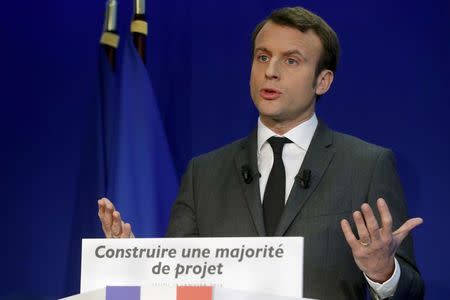Macron defies French parties with pledge to field parliament candidates
By Michel Rose PARIS (Reuters) - Independent presidential candidate Emmanuel Macron threw down a direct challenge to France's existing political parties on Thursday by announcing he would field candidates in all constituencies in June's parliamentary elections. Macron, a centrist whose rise in opinion polls is worrying leftwing and rightwing candidates in the presidential race, launched a call for applications online for all those who would like to run as a lawmaker under the colours of his young party. Elections to the lower house of parliament will come hard on the heels of the April and May presidential election and will be key to ensuring the next government has a majority to implement reforms in the euro zone's second-largest economy. The 39-year old ex-economy minister, who launched his "En Marche!" or "Onwards!" party last April, said he would field candidates in all 577 constituencies and refuse pre-vote alliances. "I want to be very clear, there will be no deal with any political party whatsoever," he said at a news conference, adding that he wanted to "break free from the backroom deals which have only served to block our country". Macron is drawing huge crowds to rallies around the country and opinion polls show he could be breathing down the neck of the election's front-runners, conservative ex-prime minister Francois Fillon and far-right leader Marine Le Pen. Macron said he would welcome applications from members of all mainstream parties, excluding Le Pen's anti-immigrant and anti-Europe National Front. But at least half the candidates would have to be fresh new faces from civil society with no political affiliation. The former investment banker is also trying to address talk among some investors that should he win the presidency, he could not count on a parliamentary majority and would be forced into a so-called "cohabition" with a hostile parliament. "The powers of the French president are extremely limited if her/his political party loses the parliamentary election," said J.P.Morgan analyst Raphael Brun-Aguerre in a note before Thursday's news conference. "It may be possible for Macron to pick up government members from various parties and propose an agenda that would be backed by a cross-party majority in the parliament. This outcome would nonetheless be hard to achieve," he wrote. There are no surveys yet for what might happen in the parliamentary elections in June. Macron, who served in a government of Socialist President Francois Hollande, is well ahead of the Socialists in opinion polls for the presidential ballot, giving rise to speculation that he may win sizeable backing from Socialist lawmakers. (Reporting by Michel Rose; Writing by Ingrid Melander; Editing by Richard Balmforth and Catherine Evans)

 Yahoo News
Yahoo News 




